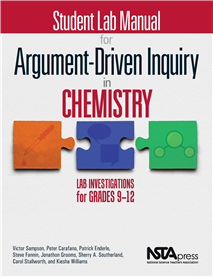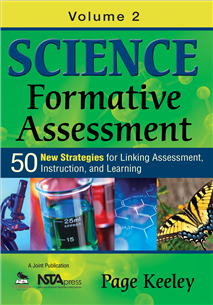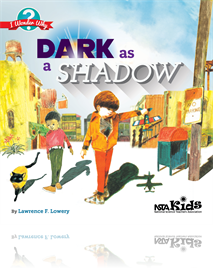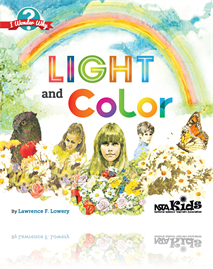All Books
NSTA Press Book
Bringing STEM to the Elementary Classroom
Many resources help you encourage young children to learn about science, technology, engineering, and math (STEM). But only this book of quality STEM experiences was curated by the veteran educator who edits Science and Children, NSTA’s award-winni...
NSTA Press Book
Science Learning in the Early Years: Activities for PreK-2
REVERE Award Winner, PreK-12 Learning Group, Association of American Publishers!...
By Peggy Ashbrook
NSTA Press Book
The Feedback Loop: Using Formative Assessment Data for Science Teaching and Learning
What really helps your students learn science: Labs? Group work? Certain types of problems or test questions? Something you never even thought about? Find out with data that go way beyond what standardized test scores tell you. The Feedback Loop desc...
By Erin Marie Furtak, Howard M. Glasser, Zora M. Wolfe
NSTA Press Book
Uncovering Student Ideas in Earth and Environmental Science: 32 New Formative Assessment Probes
If you’re new to formative assessment probes, you’ll love this timely addition to the bestselling Uncovering Student Ideas in Science series. Authors Page Keeley and Laura Tucker give you 32 engaging questions, or probes, that can reveal what you...
By Page Keeley, Laura Tucker
NSTA Press Book
Creative Writing in Science: Activities That Inspire
Do you ever feel like your science classes could use a shot of imagination? Boost the creativity quotient by assigning a travel blog about the digestive system, a packing list for the planets, or an interview with an atom. You’ll inspire students t...
By Katie Coppens
NSTA Press Book
Solar Science: Exploring Sunspots, Seasons, Eclipses, and More
Solar Science offers more than three dozen hands-on, inquiry-based activities on many fascinating aspects of solar astronomy. The activities cover the Sun’s motions, space weather caused by the Sun, the measurement of time and seasons in our daily ...
By Dennis Schatz, Andrew Fraknoi
NSTA Press Book
Are you interested in using argument-driven inquiry for high school lab instruction but aren’t sure how to do it? You aren’t alone. Argument-Driven Inquiry in Chemistry is a one-stop source of expertise, advice, and investigations, with the infor...
By Victor Sampson, Peter Carafano, Patrick Enderle, Steve Fannin, Jonathon Grooms, Sherry A. Southerland, Carol Stallworth, Kiesha Williams
NSTA Press Book
A Copublication of Corwin Press and NSTA Press...
By Page Keeley
NSTA Press Book
Reimagining the Science Department
What if you could change the department-level factors that don’t support teaching and learning? Explore answers to this fascinating question and many more with Reimagining the Science Department. In five thoughtful chapters, the book invites you t...
By Wayne Melville, Doug Jones, Todd Campbell
NSTA Press Book
The Power of Questioning: Guiding Student Investigations
This pedagogical picture book is a powerful tool in a small package....
By Julie V. McGough, Lisa M. Nyberg
NSTA Press Book
It’s challenging to teach science well to all students while connecting your lessons to the Next Generation Science Standards (NGSS). This unique book portrays real teaching scenarios written by the teachers on the NGSS Diversity and Equity Team. T...
NSTA Press Book
Teaching for Conceptual Understanding in Science
What do you get when you bring together two of NSTA’s bestselling authors to ponder ways to deepen students’ conceptual understanding of science? A fascinating combination of deep thinking about science teaching, field-tested strategies you can u...
By Richard Konicek-Moran, Page Keeley
NSTA Press Book
A Copublication of Corwin Press and NSTA Press This book shows readers how to use assessment to inform instruction and learning in the science classroom. In the bestselling first volume, Page Keeley shared 75 techniques that help K-12 science teache...
By Page Keeley
NSTA Press Book
The NSTA Quick-Reference Guide to the NGSS, High School
Since the release of the first draft of the Next Generation Science Standards (NGSS), NSTA has been at the forefront in promoting the standards and helping science educators become familiar with and learn to navigate this exciting but complex documen...
NSTA Press Book
The NSTA Quick-Reference Guide to the NGSS, Middle School
Since the release of the first draft of the Next Generation Science Standards (NGSS), NSTA has been at the forefront in promoting the standards and helping science educators become familiar with and learn to navigate this exciting but complex documen...
NSTA Press Book
The NSTA Quick-Reference Guide to the NGSS, Elementary School
Since the release of the first draft of the Next Generation Science Standards (NGSS), NSTA has been at the forefront in promoting the standards and helping science educators become familiar with and learn to navigate this exciting but complex documen...
NSTA Press Book
Using Physical Science Gadgets and Gizmos, Grades 3-5: Phenomenon-Based Learning
What student—or teacher—can resist the chance to experiment with Velocity Radar Guns, Running Parachutes, Super Solar Racer Cars, and more? The 30 experiments in Using Physical Science Gadgets and Gizmos, Grades 3–5, let your elementary school ...
By Matthew Bobrowsky, Mikko Korhonen, Jukka Kohtamaki
NSTA Press Book
Hard-to-Teach Biology Concepts, Revised 2nd Edition: Designing Instruction Aligned to the NGSS
“This book does not contain a recipe to follow as you plan and deliver lessons. Nor is it a set of predesigned lessons for use in biology classrooms. Instead, it features both an instructional framework you can use as you plan and sets of research-...
By Susan Koba, Anne Tweed
NSTA Press Book
Dark as a Shadow: I Wonder Why
Time for shadow play! After reading about how light and objects interact to create shadows, young children won’t be able to resist twisting, wiggling, bending, and shaking to see the phenomenon for themselves. To add to the enjoyment, Dark as a Sha...
By Lawrence F. Lowery
NSTA Press Book
This book unfolds as a series of observations about light, including where it comes from, how it bounces off of people and objects, and what we mean when we say the colors of a rainbow are the colors in light. Throughout the text, informal experiment...
By Lawrence F. Lowery







